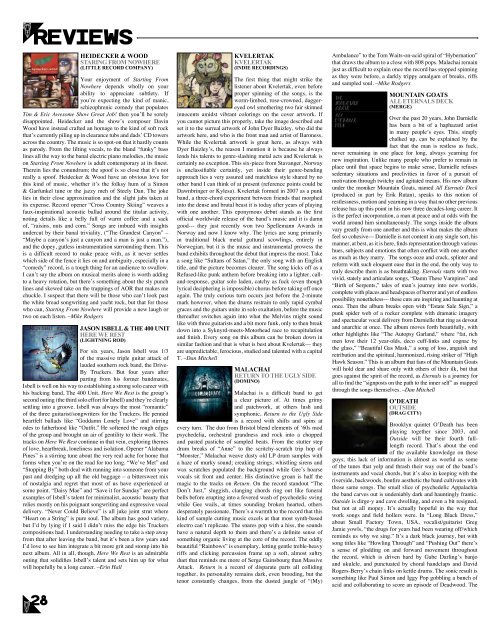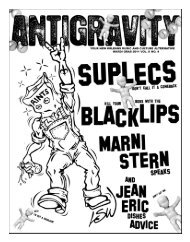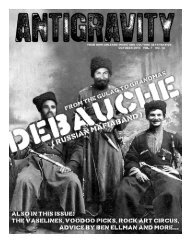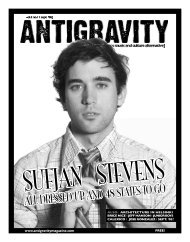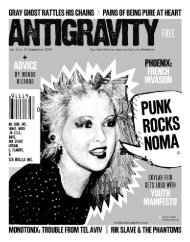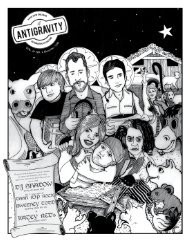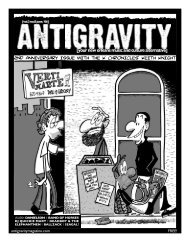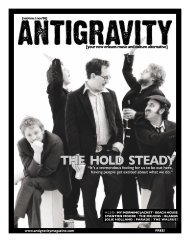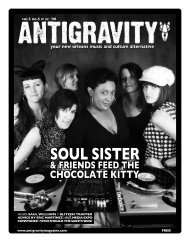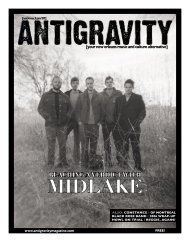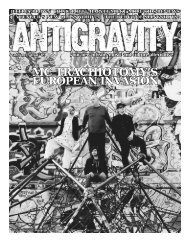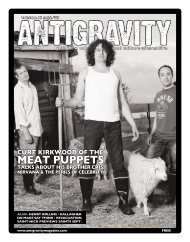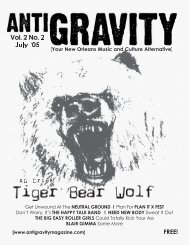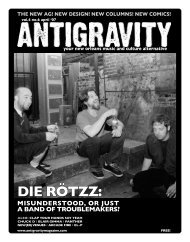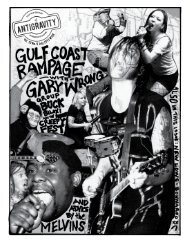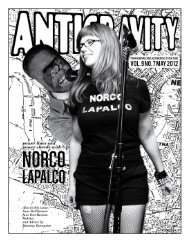April 2011 (PDF) - Antigravity Magazine
April 2011 (PDF) - Antigravity Magazine
April 2011 (PDF) - Antigravity Magazine
You also want an ePaper? Increase the reach of your titles
YUMPU automatically turns print PDFs into web optimized ePapers that Google loves.
REVIEWS<br />
Your enjoyment of Starting From<br />
Nowhere depends wholly on your<br />
ability to appreciate subtlety. If<br />
you’re expecting the kind of manic,<br />
schizophrenic comedy that populates<br />
Tim & Eric Awesome Show Great Job! then you’ll be sorely<br />
disappointed. Heidecker and the show’s composer Davin<br />
Wood have instead crafted an homage to the kind of soft rock<br />
that’s currently piling up in clearance tubs and dads’ CD towers<br />
across the country. The music is so spot-on that it hardly counts<br />
as parody. From the lilting vocals, to the bland “funky” bass<br />
lines all the way to the banal electric piano melodies, the music<br />
on Starting From Nowhere is adult contemporary at its finest.<br />
Therein lies the conundrum; the spoof is so close that it’s not<br />
really a spoof. Heidecker & Wood have an obvious love for<br />
this kind of music, whether it’s the folksy hum of a Simon<br />
& Garfunkel tune or the jazzy meh of Steely Dan. The joke<br />
lies in their close approximation and the slight jabs taken at<br />
its expense. Record opener “Cross Country Skiing” weaves a<br />
faux-inspirational acoustic ballad around the titular activity,<br />
noting details like a belly full of warm coffee and a sack<br />
of, “raisins, nuts and corn.” Songs are imbued with insights<br />
undercut by their banal triviality, (“The Grandest Canyon” –<br />
“Maybe a canyon’s just a canyon and a man is just a man.”),<br />
and the dopey, gutless instrumentation surrounding them. This<br />
is a difficult record to make peace with, as it never settles<br />
which side of the fence it lies on and ambiguity, especially in a<br />
“comedy” record, is a tough thing for an audience to swallow.<br />
I can’t say the album on musical merits alone is worth adding<br />
to a heavy rotation, but there’s something about the sly punch<br />
lines and skewed take on the trappings of AOR that makes me<br />
chuckle. I suspect that there will be those who can’t look past<br />
the white bread songwriting and yacht rock, but that for those<br />
who can, Starting From Nowhere will provide a new laugh or<br />
two on each listen. –Mike Rodgers<br />
For six years, Jason Isbell was 1/3<br />
of the massive triple guitar attack of<br />
lauded southern rock band, the Drive-<br />
By Truckers. But four years after<br />
parting from his former bandmates,<br />
Isbell is well on his way to establishing a strong solo career with<br />
his backing band, The 400 Unit. Here We Rest is the group’s<br />
second outing (the third solo effort for Isbell) and they’re clearly<br />
settling into a groove. Isbell was always the most “romantic”<br />
of the three guitarist/songwriters for the Truckers. He penned<br />
heartfelt ballads like “Goddamn Lonely Love” and stirring<br />
odes to fatherhood like “Outfit.” He softened the rough edges<br />
of the group and brought an air of gentility to their work. The<br />
tracks on Here We Rest continue in that vein, exploring themes<br />
of love, heartbreak, loneliness and isolation. Opener “Alabama<br />
Pines” is a stirring tune about the very real ache for home that<br />
forms when you’re on the road for too long. “We’ve Met” and<br />
“Stopping By” both deal with running into someone from your<br />
past and dredging up all the old baggage – a bittersweet mix<br />
of nostalgia and regret that most of us have experienced at<br />
some point. “Daisy Mae” and “Save it for Sunday” are perfect<br />
examples of Isbell’s talent for minimalist, acoustic beauty that<br />
relies mostly on his poignant songwriting and expressive vocal<br />
delivery. “Never Could Believe” is all juke joint strut where<br />
“Heart on a String” is pure soul. The album has good variety,<br />
but I’d by lying if I said I didn’t miss the edge his Truckers<br />
compositions had. I understanding needing to take a step away<br />
from that after leaving the band, but it’s been a few years and<br />
I’d love to see him integrate a bit more grit and stomp into his<br />
next album. All in all, though, Here We Rest is an admirable<br />
outing that solidifies Isbell’s talent and sets him up for what<br />
will hopefully be a long career. –Erin Hall<br />
28<br />
HEIDECKER & WOOD<br />
STARING FROM NOWHERE<br />
(LITTLE RECORD COMPANY)<br />
JASON ISBELL & THE 400 UNIT<br />
HERE WE REST<br />
(LIGHTNING ROD)<br />
KVELERTAK<br />
KVELERTAK<br />
(INDIE RECORDINGS)<br />
The first thing that might strike the<br />
listener about Kvelertak, even before<br />
proper spinning of the songs, is the<br />
worm-limbed, rose-crowned, daggereyed<br />
owl smothering two fair skinned<br />
innocents amidst vibrant colorings on the cover artwork. If<br />
you cannot picture this properly, take the image described and<br />
set it to the surreal artwork of John Dyer Baizley, who did the<br />
artwork here, and who is the front man and artist of Baroness.<br />
While the Kvelertak artwork is great here, as always with<br />
Dyer Baizley’s, the reason I mention it is because he always<br />
lends his talents to genre-slashing metal acts and Kvelertak is<br />
certainly no exception. This six-piece from Stavanger, Norway<br />
is unclassifiable certainly, yet inside their genre-bending<br />
approach lies a very assured and matchless style shared by no<br />
other band I can think of at present (reference points could be<br />
Dawnbringer or Kylesa). Kvelertak formed in 2007 as a punk<br />
band, a three-chord experiment between friends that morphed<br />
into the dense and brutal beast it is today after years of playing<br />
with one another. This eponymous debut stands as the first<br />
official worldwide release of the band’s music and it is damn<br />
good--- they just recently won two Spellemann Awards in<br />
Norway and now I know why. The lyrics are sung primarily<br />
in traditional black metal guttural scowlings, entirely in<br />
Norwegian, but it is the music and instrumental prowess the<br />
band exhibits throughout the debut that impress the most. Take<br />
a song like “Sultans of Satan,” the only song with an English<br />
title, and the picture becomes clearer. The song kicks off as a<br />
Refused-like punk anthem before breaking into a lighter, calland-response,<br />
guitar solo laden, catchy as fuck (even though<br />
lyrical deciphering is impossible) chorus before taking off once<br />
again. The truly curious turn occurs just before the 2-minute<br />
mark however, when the drums restrain to only rapid cymbal<br />
graces and the guitars unite in solo exaltation, before the music<br />
thereafter switches again into what the Melvins might sound<br />
like with three guitarists and a bit more funk, only to then break<br />
down into a Syknyrd-meets-Motorhead race to recapitulation<br />
and finish. Every song on this album can be broken down in<br />
similar fashion and that is what is best about Kvelertak--- they<br />
are unpredictable, ferocious, studied and talented with a capital<br />
T. –Dan Mitchell<br />
MALACHAI<br />
RETURN TO THE UGLY SIDE<br />
(DOMINO)<br />
Malachai is a difficult band to get<br />
a clear picture of. At times grimy<br />
and patchwork, at others lush and<br />
symphonic, Return to the Ugly Side<br />
is a record with shifts and spins at<br />
every turn. The duo from Bristol blend elements of ‘60s mod<br />
psychedelia, orchestral grandness and rock into a chopped<br />
and pasted pastiche of sampled beats. From the stutter step<br />
drum breaks of “Anne” to the scritchy-scratch trip hop of<br />
“Monster,” Malachai weave dusty old LP drum samples with<br />
a haze of murky sound; creaking strings, whistling sirens and<br />
wax scratches populated the background while Gee’s hoarse<br />
vocals sit front and center. His distinctive groan is half the<br />
magic to the tracks on Return. On the record standout “The<br />
Don’t Just,” sluggish, clanging chords ring out like funeral<br />
bells before erupting into a fevered wash of psychedelic swing<br />
while Gee wails, at times sounding broken hearted, others<br />
desperately passionate. There’s a warmth to the record that this<br />
kind of sample cutting music excels at that most synth-based<br />
electro can’t replicate. The snares pop with a hiss, the sounds<br />
have a natural depth to them and there’s a definite sense of<br />
something organic living at the core of the record. The oddly<br />
beautiful “Rainbows” is exemplary, letting gentle treble-heavy<br />
riffs and clicking percussion frame up a soft, almost sultry<br />
duet that reminds me more of Serge Gainsbourg than Massive<br />
Attack. Return is a record of disparate parts all colliding<br />
together, its personality remains dark, even brooding, but the<br />
tenor constantly changes, from the dusted jungle of “(My)<br />
Ambulance” to the Tom Waits-on-acid spiral of “Hybernation”<br />
that draws the album to a close with 808 pops. Malachai remain<br />
just as difficult to explain once the record has stopped spinning<br />
as they were before, a darkly trippy amalgam of breaks, riffs<br />
and sampled soul. –Mike Rodgers<br />
MOUNTAIN GOATS<br />
ALL ETERNALS DECK<br />
(MERGE)<br />
Over the past 20 years, John Darnielle<br />
has been a bit of a haphazard artist<br />
in many people’s eyes. This, simply<br />
chalked up, can be explained by the<br />
fact that the man is restless as fuck,<br />
never remaining in one place for long, always yearning for<br />
new inspiration. Unlike many people who prefer to remain in<br />
place until that space begins to make sense, Darnielle refuses<br />
sedentary situations and proclivities in favor of a pursuit of<br />
motivation through twitchy and agitated means. His new album<br />
under the moniker Mountain Goats, named All Eternals Deck<br />
(produced in part by Erik Rutan), speaks to this notion of<br />
restlessness, motion and yearning in a way that no other previous<br />
release has up this point in his now three decades-long career. It<br />
is the perfect incorporation, a man at peace and at odds with the<br />
world around him simultaneously. The songs inside the album<br />
vary greatly from one another and this is what makes the album<br />
feel so cohesive--- Darnielle is not content in any single sort, his<br />
manner, at best, as it is here, finds representation through various<br />
hues, subjects and emotions that often conflict with one another<br />
as much as they marry. The songs ooze and crack, splinter and<br />
reform with such eloquent ease that in the end, the only way to<br />
truly describe them is as breathtaking. Eternals starts with two<br />
vivid, stately and articulate songs, “Damn These Vampires” and<br />
“Birth of Serpents,” tales of man’s journey into new worlds,<br />
complete with places and headspaces of horror and yet of endless<br />
possibility nonetheless--- these cuts are inspiring and haunting at<br />
once. Then the album breaks open with “Estate Sale Sign,” a<br />
punk spider web of a rocker complete with dramatic imagery<br />
and spectacular vocal delivery from Darnielle that ring as devout<br />
and anarchic at once. The album moves forth beautifully, with<br />
other highlights like “The Autopsy Garland,” where “fat, rich<br />
men love their 12 year-olds, deco cuff-links and cognac by<br />
the glass,” “Beautiful Gas Mask,” a song of loss, anguish and<br />
retribution and the spiritual, harmonized, rising striker of “High<br />
Hawk Season.” This is an album that fans of the Mountain Goats<br />
will hold dear and share only with others of their ilk, but that<br />
goes against the spirit of the record, as Eternals is a journey for<br />
all to find the “signposts on the path to the inner self” as mapped<br />
through the songs themselves. –Dan Mitchell<br />
O’DEATH<br />
OUTSIDE<br />
(DRAG CITY)<br />
Brooklyn quintet O’Death has been<br />
playing together since 2003, and<br />
Outside will be their fourth fulllength<br />
record. That’s about the end<br />
of the available knowledge on these<br />
guys; this lack of information is almost as woeful as some<br />
of the tunes that yelp and thrash their way out of the band’s<br />
instruments and vocal chords, but it’s also in keeping with the<br />
riverside, backwoods, bonfire aesthetic the band cultivates with<br />
those same songs. The small slice of psychedelic Appalachia<br />
the band carves out is undeniably dark and hauntingly frantic.<br />
Outside is dirge-y and cave dwelling, and even a bit resigned,<br />
but not at all mopey. It’s actually hopeful in the way that<br />
work songs and field hollers were. In “Long Black Dress,”<br />
about Small Factory Town, USA, vocalist/guitarist Greg<br />
Jamie yowls, “the drugs for years had been wearing off/which<br />
reminds us why we sing.” It’s a dark black journey, but with<br />
song titles like “Howling Through” and “Pushing Out” there’s<br />
a sense of plodding on and forward movement throughout<br />
the record, which is driven hard by Gabe Darling’s banjo<br />
and ukulele, and punctuated by choral handclaps and David<br />
Rogers-Berry’s chain links on kettle drums. The sonic result is<br />
something like Paul Simon and Iggy Pop gobbling a bunch of<br />
acid and collaborating to score an episode of Deadwood. The


